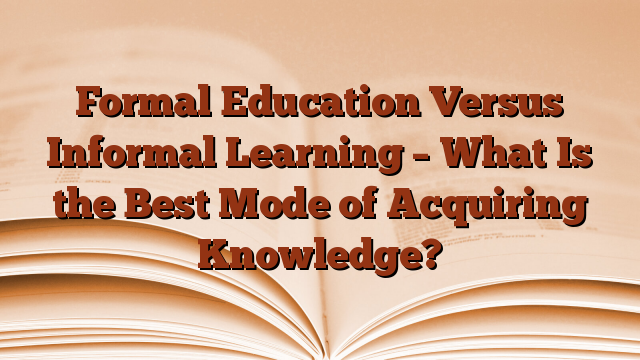The key to effective learning is acquiring new ideas and making existing knowledge and skills more effective. According to the experts, informal learning is the ideal way to achieve this goal. With the growing reliance on technology, the collaborative aspects of education have become more important. The formal training in a traditional classroom, where the entire training process is controlled by the trainer, is replaced by the informal mode. In the latter, the knowledge transfer process is initiated and controlled by the learners.
There has always been a debate about which training process is more effective to achieve the best result. Normally in formal processes goals and objectives are predefined and therefore narrowed down to limited industry specific things. On the contrary, in an informal scenario, learners are free to pick up something of their interest and continue study through various informal channels.
In the case of formal training, the study material and the structural model of the curriculum are determined by the trainers or the course coordinators. In short, a formal process is carried out within a set timeframe that requires learners to have certain skills in order to participate in the training programs. Upon successful completion of the training programs, students are rewarded with certificates. Pre-planning makes the learning process more structured. Business organizations with specific goals and objectives organize such training programs. They follow a clear benchmark in a structured system against which the employee’s performance is measured.
Unlike the formal process, the informal environment never provides a structure or planned program. It can be continued anytime the learners encounter a specific need. Nowadays, informal learning is also accepted in companies and academic institutions. Learners can participate in various discussion forums online and share their views on various subjects and issues. In this way, the field of knowledge is expanding, with new areas of training and knowledge emerging almost daily.
As technology changes and improves at a rapid pace, information available through traditional resources such as books is becoming obsolete. Over time, peer-to-per interaction has taken center stage and is currently the preferred method of education.
Formal learning is carried out in the organizations through seminars, conferences, training programs and so on. In most cases, the purpose of the formal education process is to ensure employee performance improvement. In addition, it helps learners to improve their employment opportunities.
Social media platforms like Facebook, Twitter and LinkedIn coupled with industry specific discussion forums, blogs and groups have provided a solid platform to conduct informal learning processes with ease. As a result, informal learning has been taken more seriously in recent years.
However, the success of an exercise program depends on how effectively its goals are met. Both procedures are effective in their own way and can produce the best results when used correctly.
Thanks to Jonathan Reynold | #Formal #Education #Informal #Learning #Mode #Acquiring #Knowledge

Leave a Reply